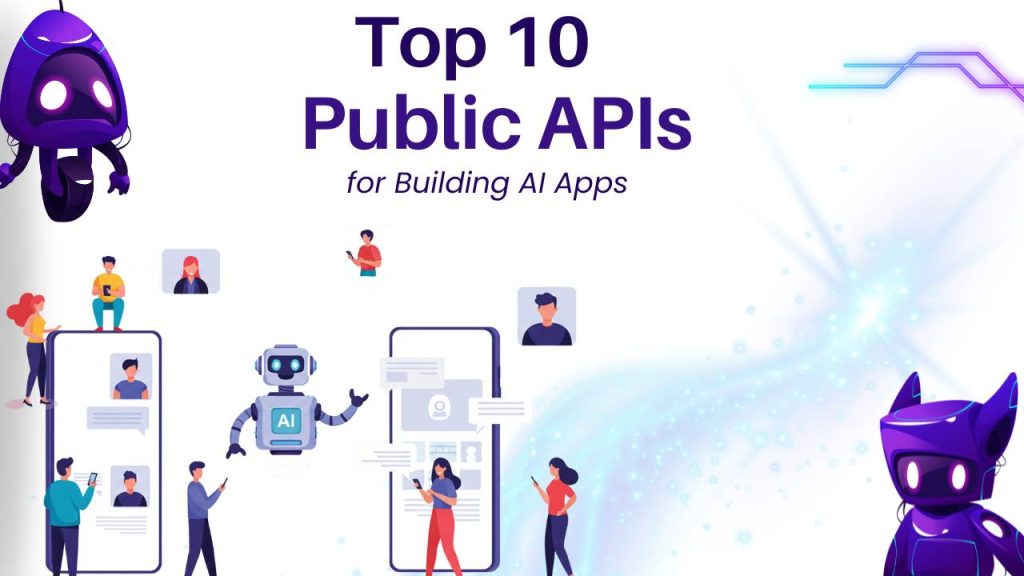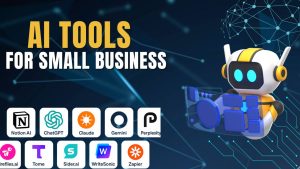Artificial Intelligence (AI) continues to drive innovation across industries—from healthcare to finance, e-commerce to education. As a developer, entrepreneur, or enterprise, integrating AI into your applications can dramatically enhance functionality, user experience, and automation. Thanks to powerful public APIs, you don’t need to build machine learning models from scratch. Instead, you can plug into pre-trained, scalable AI services.
10 Best AI Tools for Small Businesses in 2025
Get to know the Top 10 Public APIs for Building AI Apps, showcasing why these are considered the best AI APIs in 2025 and how they can supercharge your next project.
Top 10 Public APIs for Building AI Apps
1. OpenAI API (GPT-4o, GPT-4.5, ChatGPT)
OpenAI’s API, featuring the latest GPT-4.5 and GPT-4o models, is one of the most powerful and versatile AI services available today. GPT-4o, being a multimodal model, accepts and responds using text, images, and audio, making it an all-in-one solution for building highly interactive and intelligent applications.
What makes OpenAI’s API stand out is its deep contextual understanding. It can summarize large documents, translate languages accurately, create human-like conversations, write executable code, and even generate creative content like poems and marketing copy. With strong memory, customizable API, and natural tone, this tool easily ranks among the best AI APIs available today.
Startups use GPT-4o to build shopping assistants that understand preferences. Educators deploy it for behavior-aware virtual tutoring. Its flexibility, SDKs, and easy integration make GPT-4o a top choice for AI development in 2025.
2. Google Cloud AI APIs
Google Cloud provides a comprehensive suite of AI services under its Vertex AI and Cloud AI product lines. With APIs for vision, natural language, speech, translation, and AutoML capabilities, developers can plug into powerful models trained with Google’s extensive data and AI research.
The Vision API allows developers to analyze images for labels, facial attributes, logos, and handwriting. Google’s Speech-to-Text and Text-to-Speech APIs provide high-quality audio conversion services in multiple languages. Their Natural Language API can extract entities, identify sentiment, and classify content by category.
These features are being used by enterprises to build scalable, AI-powered systems such as customer support bots, document digitization pipelines, and content moderation tools. The combination of Google’s cloud infrastructure, model quality, and auto-scaling options makes these services some of the best AI APIs for businesses aiming for global-scale deployments.
3. Microsoft Azure Cognitive Services
Microsoft Azure’s Cognitive Services package delivers a modular collection of AI capabilities that cater to developers looking for enterprise-grade solutions. From computer vision and language understanding to real-time speech services and OpenAI integration, Azure offers a robust, secure, and scalable environment for AI-powered application development.
What distinguishes Azure from many others is its flexibility in handling both pre-trained models and custom models through Azure Machine Learning. Developers can deploy models within the Azure cloud or at the edge using containers, offering powerful versatility. Tools like Language Understanding (LUIS) help developers create conversational AI agents with advanced intent recognition and multilingual capabilities.
Large organizations rely on Azure’s Face API for employee authentication, its Form Recognizer for intelligent document extraction, and its Azure OpenAI endpoints for secure LLM integration. The synergy between Microsoft’s cloud ecosystem and OpenAI makes Azure’s suite one of the most trusted and best AI APIs on the market.
4. IBM Watson AI APIs
IBM Watson, once famous for winning Jeopardy, has evolved into a commercial powerhouse for AI in enterprise environments. It offers APIs specializing in Natural Language Processing (NLP), knowledge mining, and automated workflows.
Watson’s Natural Language Understanding (NLU) can analyze emotion, sentiment, keywords, and relations in content—making it ideal for analyzing customer feedback, support tickets, or online reviews. Watson Assistant lets businesses build intelligent virtual agents that can interpret context and respond naturally in multi-turn conversations.
Financial institutions use Watson Discovery to parse regulatory documents and extract risk information. Medical research platforms integrate Watson NLU for identifying relevant clinical data. The platform’s adherence to strict governance and transparency also makes it one of the best AI APIs for sensitive industries like finance and healthcare.
5. AssemblyAI
AssemblyAI is a leading player in the speech recognition space, offering a high-accuracy API for converting spoken audio into text in real-time or batches. Beyond transcription, it provides intelligent audio insights such as topic detection, sentiment analysis, content moderation, and entity detection.
Developers use AssemblyAI for building smart call center platforms, transcription tools for journalists and podcasters, and voice-driven content creation apps. One of its strongest features is the ability to remove filler words, redacting PII (personally identifiable information) in transcripts for compliance, and detecting multiple speakers in the same audio.
This deep speech analysis makes AssemblyAI one of the best AI APIs for applications involving voice input, automated note-taking, and meeting analytics—especially where speed and accuracy are critical.
6. Stability AI (Stable Diffusion API)
Stability AI’s Stable Diffusion API revolutionized how developers approach image generation. With just a few lines of code, you can now generate high-resolution, photorealistic, or artistic images from simple text prompts. Its accessibility and open-source model make it particularly appealing for creative professionals, game developers, and marketers.
The API supports inpainting (editing specific image parts), outpainting (expanding image borders), and style transfers, which are used by digital artists to prototype characters or scenes within seconds. Content creators use it to automate social media imagery, while marketing agencies generate custom ad visuals without hiring designers.
This API is undoubtedly one of the best AI APIs for those looking to bring visual creativity into automation workflows or consumer apps with dynamic image generation.
7. Hugging Face Inference API
Hugging Face offers the most extensive open-source model repository for NLP, audio, and vision models. Its Inference API lets developers use models like BERT, GPT2, Whisper, and RoBERTa in real-time without infrastructure hassle. It provides everything from zero-shot classification and summarization to voice recognition and translation.
Thousands of developers and researchers rely on Hugging Face to quickly test and deploy state-of-the-art models in production. For instance, a legal startup can use Hugging Face’s summarization models to process hundreds of contracts a day. Content platforms can filter toxicity using sentiment detection models.
Hugging Face’s open science approach and support for model fine-tuning make it one of the most flexible and best AI APIs for research, education, and commercial applications.
8. Amazon Web Services (AWS) AI & ML APIs
AWS offers some of the most mature and reliable AI services in the cloud ecosystem. Through services like Amazon Comprehend, Lex, Rekognition, and Polly, developers can build AI features for voice, vision, and language that scale to millions of users.
Comprehend extracts sentiment and entities from text; Polly converts text into human-like speech; Lex powers chatbots with automatic speech recognition and natural language understanding; and Rekognition can detect faces, objects, and activities in images and videos.
These APIs are widely adopted in industries like e-commerce, logistics, and media streaming. For instance, a retail company may use Rekognition to match product images for catalog optimization while using Polly to offer multilingual voice experiences.
With strong performance, scalability, and security, AWS stands tall among the best AI APIs available in the enterprise cloud market.
9. Deepgram API
Deepgram is a high-performance automatic speech recognition (ASR) API known for its low-latency, deep learning-based approach to transcribing spoken content. Unlike traditional methods that break speech into phonemes, Deepgram processes entire audio spectrograms, allowing for better contextual recognition.
It supports domain-specific models—meaning you can customize transcriptions for medical, legal, or customer service applications. Features like multi-language support, automatic punctuation, speaker diarization, and real-time streaming make it suitable for dynamic environments.
Companies use Deepgram to power everything from virtual meeting assistants and real-time translation services to voice-enabled analytics platforms. The speed and precision it delivers place it firmly on the list of the best AI APIs in the speech recognition domain.
10. Clarifai API
Clarifai is a powerful computer vision platform offering tools to analyze, tag, and search image and video content. It provides both general-purpose and custom-trained AI models, along with robust labeling and training workflows via its user-friendly interface.
The API supports object detection, facial recognition, scene classification, and more. Businesses can use it for a variety of applications like quality assurance in manufacturing, in-store customer behavior analysis, or automated moderation of user-generated content on social platforms.
Clarifai stands out for its ability to deploy models to the edge, which is especially valuable in industrial and IoT scenarios. With its strong documentation, pre-built models, and training tools, Clarifai continues to rank among the best AI APIs for developers working in vision-heavy projects.
FAQs
1. What are the best AI APIs available in 2025?
The best AI APIs in 2025 include OpenAI (GPT-4o), Google Cloud AI, Microsoft Azure Cognitive Services, Hugging Face, IBM Watson, and AssemblyAI. These APIs offer powerful features in natural language processing, speech recognition, image generation, and more.
2. Which AI API is best for building chatbots?
OpenAI’s GPT-4o and Google Dialogflow are among the best AI APIs for chatbot development. They offer advanced natural language understanding, contextual memory, and easy integration with messaging platforms.
3. Are AI APIs free to use for beginners or startups?
Many of the best AI APIs offer free tiers with limited usage, such as OpenAI, Hugging Face, and Deepgram. These are ideal for testing, prototypes, and learning before scaling to paid plans.
4. Which AI API is best for speech-to-text transcription?
AssemblyAI and Deepgram provide highly accurate and real-time speech-to-text APIs. They support multiple languages, speaker diarization, and audio intelligence features.
5. Can I use multiple AI APIs in one application?
Yes, many developers combine different AI APIs for various functions—such as using OpenAI for text generation, AssemblyAI for voice transcription, and Clarifai for image analysis in the same app.
6. What are the best AI APIs for image and video analysis?
Clarifai, Stability AI (Stable Diffusion), and Google Vision API are top choices for visual AI. They provide object detection, face recognition, and image generation capabilities.
7. Are these AI APIs secure for handling sensitive data?
Most leading AI APIs, such as Azure, AWS, and IBM Watson, offer enterprise-grade security, data encryption, and compliance with regulations like GDPR and HIPAA for safe data handling.
8. How do I choose the best AI API for my use case?
Consider your application’s specific needs—text, image, speech, or multimodal—along with factors like cost, ease of integration, scalability, and support when choosing the best AI API.
9. Which AI APIs support multimodal inputs like text, image, and audio?
OpenAI’s GPT-4o supports multimodal input and output, making it ideal for applications that require processing across different media types in a single API call.
10. Do the best AI APIs support real-time processing?
Yes, APIs like Deepgram, AssemblyAI, and OpenAI (via WebSockets or streaming APIs) offer real-time processing capabilities, which are essential for live transcription, chat, or voice assistant apps.






